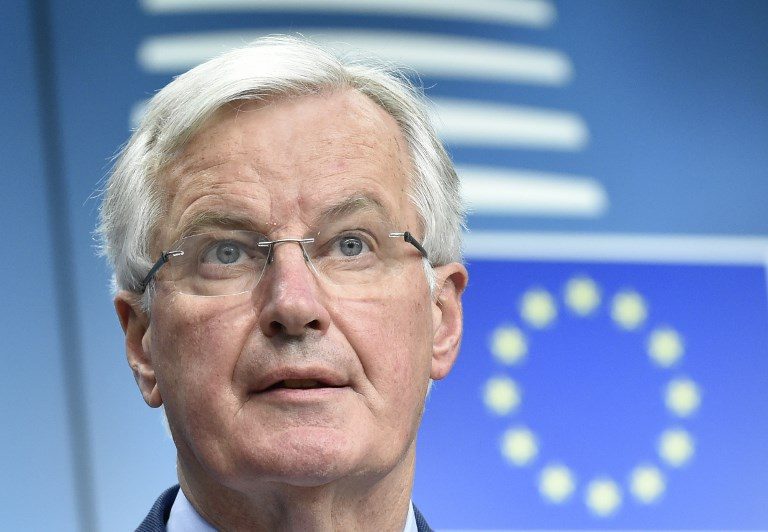SUMMARY
This is AI generated summarization, which may have errors. For context, always refer to the full article.

BRUSSELS, Belgium – Britain must follow EU laws despite losing all involvement in decision-making during a post-Brexit transition period, the bloc said Monday, January 29, as it agreed its demands for the temporary phase.
EU negotiator Michel Barnier rejected London’s calls for a “right to object” to any new rules passed during the 21-month period lasting from the day Britain leaves on March 29, 2019 to December 31, 2020.
The plan – approved by EU ministers in just two minutes – has sparked deep divisions in the British government, with eurosceptic lawmakers saying it leaves Britain a “vassal state” of Brussels.
“The EU position is very clear,” French former foreign minister Barnier told a news conference in Brussels. “Britain will continue to have all the economic benefits, therefore it must apply all the rules.”
Britain asked for the transition to ease the impact on people, businesses and public services from leaving the EU’s single market, and to allow more time to negotiate an eventual trade deal with Brussels.
But the EU’s insistence on keeping the “status quo” during that time has prompted furious Brexit-supporting lawmakers to cause fresh trouble for embattled Prime Minister Theresa May.
It also threatens to dash hopes the transition talks would be easier than negotiations on the Brexit bill and Northern Ireland that ended in a hard-fought withdrawal agreement in December.
‘There will be an argument’
British Brexit minister David Davis said on Monday that the priority was for Britain to be able to sign free trade pacts with other countries, adding: “We want a high degree of stability and the right to do deals. Broadly that’s it.”
But he said that during the negotiations on the transition – which could start as soon as this week – “there will an argument about the issue of whether we can object to new laws.”
May’s Downing Street office agreed. “We’ll have to agree a way of resolving concerns if laws are deemed to run contrary to our interests,” a spokesman said.
But Barnier retorted by saying that Britain knew when it requested the transition that it would be expected to follow all EU laws, and ruled out any mechanism for challenging new rules passed after March 2019.
“During this period all decisions will apply and the UK must know this rule, and accept it from the start,” Barnier said.
The EU took pains to flag up the decision as a fresh display of unity in the Brexit talks, ahead of discussions on future relations with with Britain in April that could prove more divisive between hawks and doves in the bloc.
European affairs ministers adopted the transition negotiating directives “within two minutes”, Barnier’s deputy Sabine Weyand tweeted.
‘No voice at the table’
Irish European affairs minister Helen McEntee ruled out Britain having any power to vet EU laws, adding that “when the UK leaves the European Union they will not be a voice around the table.”
Ireland is a key player in the talks, especially as December’s withdrawal agreement left many unresolved issues around the prevention of a “hard border” with the British-ruled province Northern Ireland.
Bulgarian Deputy Prime Minister Ekaterina Zaharieva – whose country holds the EU’s rotating presidency – urged Britain to agree “as soon as possible” on the legal text of the divorce deal.
Barnier meanwhile reiterated that agreement on the withdrawal, the transition and the framework of future relations all had to be in place by the end of October in order to be ratified by the European and British parliaments in time for March 2019.
The Brexit transition talks are piling pressure on May, who won barely a month’s respite from eurosceptics with December’s accord to wrap up the first phase of the talks.
With dangerous rifts emerging openly among May’s government, Davis and other top ministers tried to show a united front at the weekend with a joint letter insisting the transition was the best solution.
But Jacob Rees-Mogg – who leads a group of more than 50 Conservative Brexiteer MPs and made the “vassal state” comment – warned that staying closely aligned to the EU risked reducing Brexit to a “damage limitation exercise”.
US President Donald Trump added to the onslaught on his supposed ally, saying in remarks aired Sunday, January 28, that if he was in charge of the Brexit negotiations he would have “negotiated it differently” to May and taken a “tougher stand”. – Rappler.com
Add a comment
How does this make you feel?
There are no comments yet. Add your comment to start the conversation.